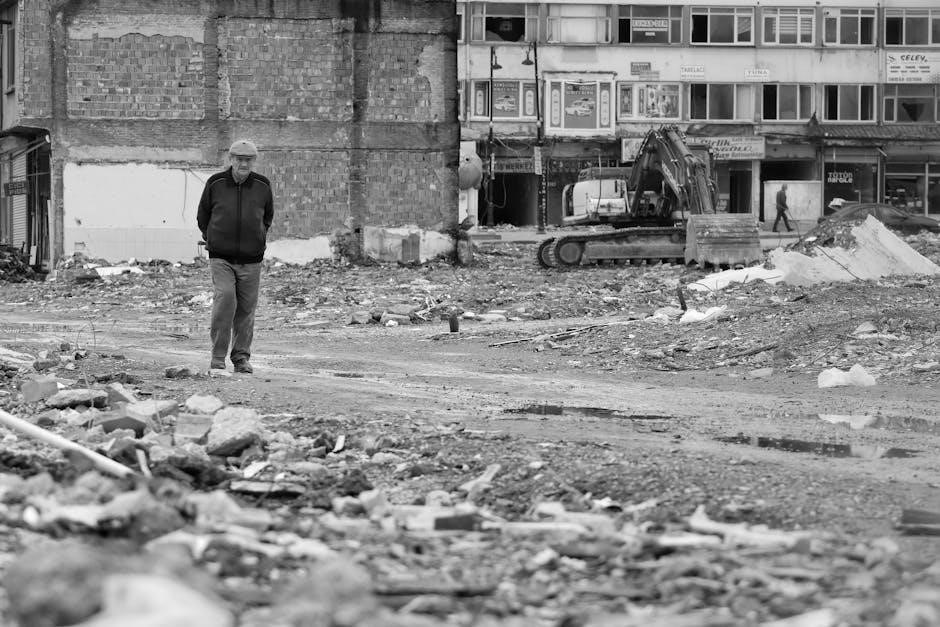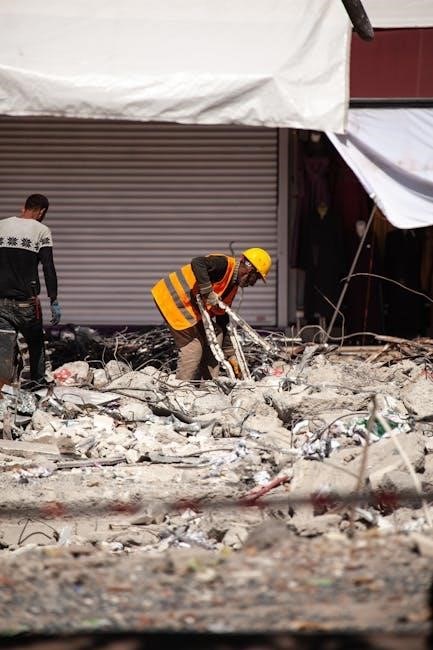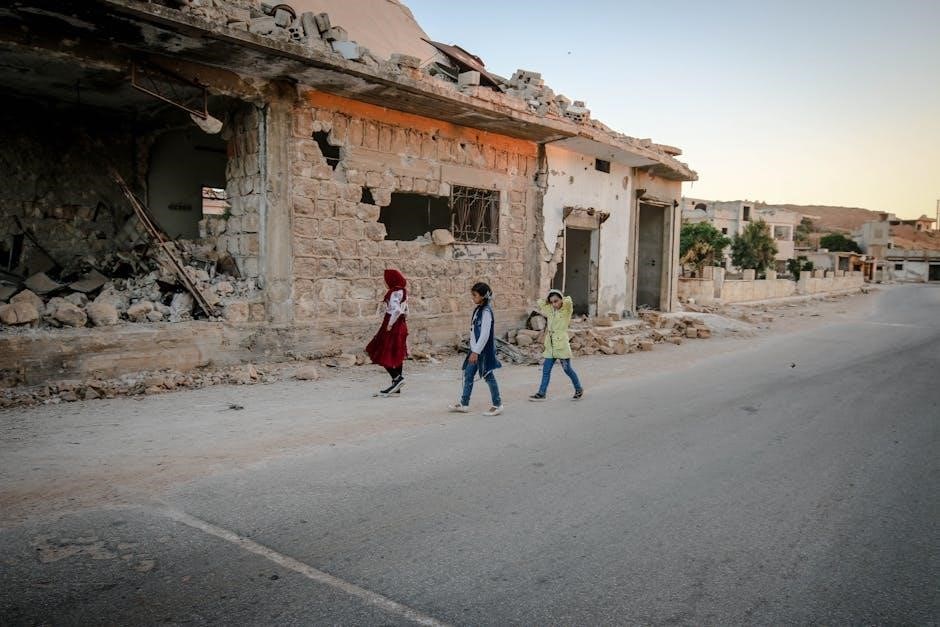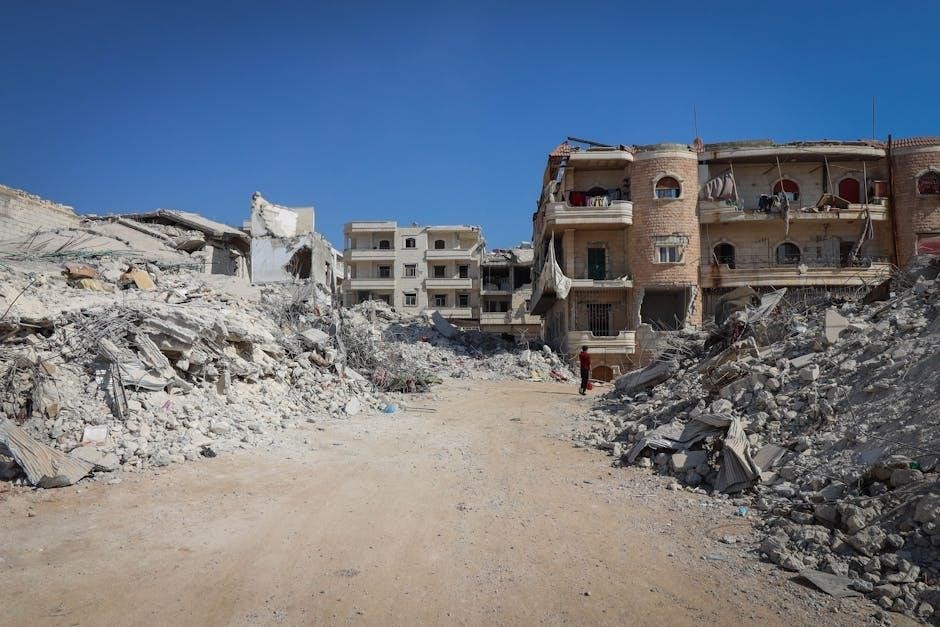The Ultimate Guide to Rebuilding Civilization offers a comprehensive roadmap for creating a sustainable future, blending survival skills, ethical practices, and innovative solutions to restore humanity’s potential.

Essential Survival Skills
Mastery of fire-making, water sourcing, and food procurement is crucial for survival, alongside shelter construction and tool crafting, ensuring a strong foundation for rebuilding civilization.
Fire Making
Fire making is a foundational survival skill, essential for warmth, cooking, and light. The Ultimate Guide to Rebuilding Civilization details ancient techniques like flint-and-steel, bow drill, and hand drill methods. These practices require patience and knowledge of materials such as dry wood, kindling, and tinder. The guide emphasizes the importance of fire in community building, as it fosters collaboration and shared resources. Modern tools, like ferrocerium rods and lighters, are also explored for their efficiency in igniting flames. Fire making is not just a survival tool but a symbol of resilience and progress, enabling civilization to thrive even in challenging environments. Its significance extends to food preparation, sanitation, and moral upliftment, making it a cornerstone of human ingenuity and adaptability. Mastering this skill is vital for rebuilding and sustaining life in a post-crisis world.
Water Sourcing
Water sourcing is a critical component of survival and civilization rebuilding, as highlighted in the Ultimate Guide to Rebuilding Civilization. The guide details methods for locating and purifying water, such as identifying natural springs, harvesting rainwater, and sourcing rivers or ponds. Techniques like solar stills and sand filtration are emphasized for safe consumption. Understanding water cycles and conservation practices ensures long-term sustainability. The guide also covers ethical considerations, such as equitable access to water resources, essential for maintaining social harmony. Proper water management is vital for agriculture, hygiene, and community health, making it a cornerstone of rebuilding efforts. The ability to source and manage water effectively is a key determinant of a civilization’s resilience and prosperity. This skill bridges survival and sustainability, ensuring a thriving future for generations.

Core Principles for a Sustainable Future
The guide emphasizes environmental stewardship, resource efficiency, and ethical practices as core principles for a sustainable future, ensuring resilience and equity for all generations.
Sustainability Practices
Sustainability practices form the backbone of rebuilding civilization, focusing on renewable energy, eco-friendly construction, and organic farming. These methods ensure resource conservation and minimize environmental impact. By adopting circular economies and reducing waste, communities can thrive without depleting natural reserves. The guide highlights the importance of ethical land use and biodiversity preservation to maintain ecological balance. Implementing sustainable practices requires a shift in mindset, prioritizing long-term benefits over short-term gains. This approach fosters resilience, ensuring that future generations inherit a livable and prosperous world. The Ultimate Guide provides actionable strategies to integrate these practices into everyday life, making sustainability accessible and achievable for all.

Building Sustainable Infrastructure
The guide emphasizes constructing eco-friendly buildings using renewable materials and integrating renewable energy sources to create resilient, energy-efficient communities for a sustainable future.
Renewable Energy Solutions
Renewable energy is crucial for a sustainable future, as outlined in the guide. Solar, wind, hydro, and geothermal sources are highlighted as key alternatives to fossil fuels. The guide emphasizes the importance of reducing reliance on non-renewable resources and integrating renewable energy systems into infrastructure. It provides detailed strategies for implementing solar panels, wind turbines, and hydroelectric power on both small and large scales. Energy storage solutions, such as advanced battery systems, are also discussed to ensure consistent power supply. Additionally, the guide explores bioenergy and hydrogen fuel cells as complementary technologies. By prioritizing renewable energy, civilizations can significantly reduce carbon emissions and dependence on finite resources, paving the way for a cleaner, more resilient energy framework for future generations.
Technology and Innovation
Technology and innovation are cornerstone elements in rebuilding civilization, as highlighted in the guide. The book emphasizes the importance of leveraging ancestral skills, such as fire-making and crafting, alongside advanced technologies like renewable energy and material science. It explores how sustainable practices can be enhanced through innovative solutions, ensuring resources are used efficiently. The guide also delves into the role of education and knowledge preservation, stressing that innovation thrives when communities prioritize learning and adaptability. By balancing traditional wisdom with modern advancements, societies can create resilient systems that support long-term growth. The ultimate goal is to foster a future where technology serves humanity and the planet, driving progress without compromising ethical standards or environmental integrity.
Social Structures and Governance
Social structures and governance play a pivotal role in rebuilding civilization, as outlined in the guide. The book underscores the need for equitable systems that promote unity and cooperation, ensuring all community members have a voice. It explores various governance models, from decentralized councils to participatory democracies, highlighting their strengths and challenges. The guide also emphasizes the importance of cultural identity and shared values in fostering resilience. By establishing clear, fair laws and promoting transparency, societies can build trust and stability. The ultimate aim is to create governance that not only manages resources effectively but also empowers individuals, ensuring a harmonious balance between collective needs and individual freedoms.
Education and Knowledge Preservation
Education is the cornerstone of rebuilding civilization, as emphasized in the guide. It highlights the importance of preserving knowledge through structured learning systems, ensuring the survival of critical skills and ideas. The book advocates for accessible education, focusing on practical skills like agriculture, engineering, and medicine, alongside cultural and historical knowledge. By establishing libraries, schools, and apprenticeships, communities can safeguard wisdom for future generations. The guide also stresses the role of storytelling and oral traditions in maintaining cultural identity. By prioritizing education, societies can foster innovation and adaptability, laying the foundation for a resilient and enlightened future where knowledge serves as a bridge between past and tomorrow.

Ethical Considerations in Rebuilding
Ethical considerations are central to rebuilding civilization, ensuring that progress aligns with moral principles. The guide emphasizes fairness, justice, and environmental stewardship, urging leaders to prioritize long-term sustainability over short-term gains. It advocates for inclusive decision-making, where diverse voices contribute to equitable policies. The book also explores the importance of accountability and transparency in governance to prevent exploitation and corruption. By integrating ethical frameworks, societies can avoid past mistakes, fostering trust and cooperation. Ultimately, the guide calls for a harmonious balance between technological advancement and nature, ensuring that the rebuilt world is not only resilient but also just and compassionate for all its inhabitants. These principles serve as a moral compass, guiding humanity toward a brighter, more ethical future.
